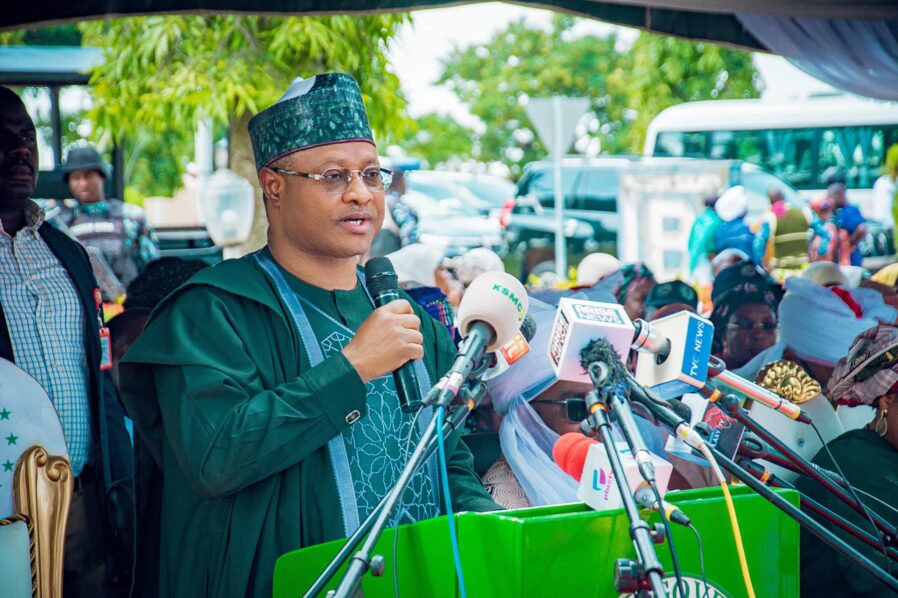
Governor Uba Sani has said his administration has taken steps to improve rural communities, enhance security, and drive economic growth in Kaduna State within less than two years of his assumption of office.
The governor made this statement during an interactive session on Thursday at the secretariat of the Nigeria Union of Journalists (NUJ), noting that the government has addressed security challenges and directed the state toward the much-needed road to economic development and growth.
Sani, who was represented at the occasion by his Principal Private Secretary (PPS), Professor Bello Ayuba, explained that “no doubt, there has never been any administration in the history of Kaduna State that achieved so much within a short time and with limited resources like the present government.”
According to him, in less than two years, the administration in Kaduna State has been rapidly transforming rural communities through massive infrastructural development, the revival and revitalization of the health and educational sectors, frontally fighting poverty, and strengthening partnerships with security forces to secure the state.
Stressing the area of security, he noted that the government has forged a solid partnership with federal security forces to secure Kaduna State by giving them logistics support to enhance their operations, just as the government distributed 150 operational vehicles and 500 motorcycles to them and the Kaduna State Vigilance Service (KADVS) to boost their operations.
Besides, he stressed, the state government has signed the Kaduna State Security Trust Fund Bill into law.
He said, “The trust fund will raise funds for the acquisition and deployment of even more security equipment, personnel, and materials, as well as the training of security personnel.
“Through the efforts of the Peace Dialogue Group established by the Kaduna State Government in collaboration with federal agencies and security services, peace has returned to Birnin Gwari.
“On November 29, the governor reopened the famous and strategic Birnin Gwari Market, which had been closed for about 10 years, thus signaling the commencement of commercial activities. Above all, the long-abandoned Birnin Gwari Road has come back to life. Similarly, Kidandan Market in Giwa Local Government of Kaduna State, which had not been patronised for several years owing to insecurity, has been opened. Indeed, this marks the beginning of the return of peace and stability to Giwa Local Government.
“Significantly, Governor Uba Sani has been embarking on massive rural development by extending infrastructure development to all local government areas, with the goal of supporting rural communities to achieve rapid economic growth and development. In this regard, the government has undertaken 68 road projects, covering a total of approximately 700 kilometers across the three senatorial districts.”
The government further pointed out that human capital development is one of the pivots of the Governor Sani administration, and for this reason, it has improved access to education and revived the health sector.
“So far, the Kaduna State Government has built 62 new secondary schools, comprising 39 junior and 23 senior secondary schools, across the three senatorial districts. Besides, approval has been given for the construction of an additional 50 secondary schools across the state. Upon completion, these new schools are expected to enroll over 100,000 students, further solidifying Kaduna State’s commitment to providing inclusive and accessible education for all. Also, 2,000 qualified teachers have been recruited, awaiting deployment to these newly completed schools.
“In addition, the government has constructed 2,326 new classrooms, renovated 707 classrooms, supplied 30,742 two-seater pupil’s furniture, provided 3,704 teachers’ furniture, and constructed 918 VIP cubicle toilets and 51 hand pump boreholes in schools across the state,” he added.
The Sani administration was also said to have placed agriculture at the center of Kaduna State’s development agenda, noting that in the last 18 months, Kaduna State has become a beacon of hope for smallholder farmers, an engine of economic growth, and a model of agricultural excellence.
“Under the remarkable palliative programme, Sustainable Livelihoods through Social Interventions and Economic Empowerment, the Get Back to the Farm initiative has breathed new life into the agricultural sector. The government has distributed vital inputs—high-quality seeds, fertilizers, agrochemicals, and farming equipment—to 41,693 smallholder farmers and cooperatives across all 23 LGAs. This initiative is a game-changer for our farmers, restoring their livelihoods and driving increased productivity across the state.
“Significantly, the Uba Sani administration undertook the largest free fertilizer distribution in Kaduna State’s history, with the distribution of 500 trucks of fertilizer from which 240,000 bags were given out free to 120,000 smallholder farmers. The government has also invested heavily in both mechanization and micro-mechanization of the agricultural sector. Indeed, the last time the state invested in mechanization through the procurement of tractors was in 2010, but this government has procured 12 heavy-duty tractors that can handle large-scale commercial farming and complex and difficult farming operations
“Since assuming office in May 2023, Governor Uba Sani has placed a high premium on bringing succor to the poor, vulnerable, and underserved in Kaduna State. In this regard, he has been carrying out pro-poor measures to bring needed relief to Kaduna State citizens, first by signing an Executive Order on Financial Inclusion. By so doing, the governor has shown commitment to addressing the exclusion of the poor, underserved, and vulnerable from financial services and ensuring that they benefit from social intervention programs of Kaduna State and the Federal Government.
“The aim is to empower people with tools like savings accounts, credit, insurance, and digital payment options, enabling them to participate in the formal financial system, manage their finances, and build economic resilience,” he added.






